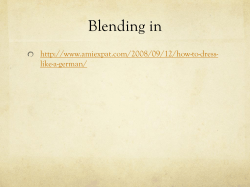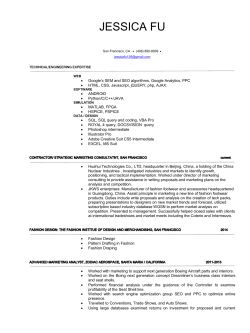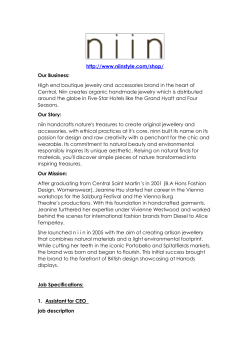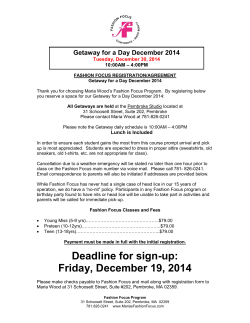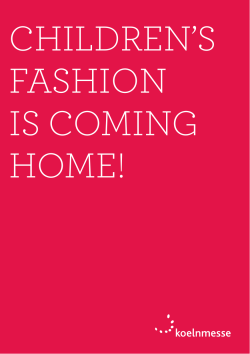
Fleur
Fleur What Is Culture? The word culture comes from the Latin word cultura meaning “to cultivate” Culture is all the behaviors, arts, beliefs and institutions of a specific population that are passed down from generation to generation Culture can also be defined as a shared, learned, symbolic system of values, beliefs and attitudes that shapes and influences perception and behavior Culture is “The way of life for an entire society” Culture is shown through music, literature, art, theatre and film as well as many other things General Attitudes The French measure success by education level, family reputation, and financial status Among the most patriotic in the world, they are extremely proud of their culture, heritage, and way of life The expect that visitors to their country have a general knowledge of the French way and show appreciation for French culture The country seeks to maintain its identity by resisting the growing popularity of cheap fast food, foreign sitcoms, and American music The French government restricts the percentage of nonFrench entertainment on national radio and television channels General Attitudes continued The French are reserved and private but tend to be more hospitable outside of Paris. They also have different rules of behavior for people within their social circle and those who are not Politeness is valued in all interaction in France The French take great care to dress well weather they are wearing formal or casual attire, and they feel more at ease with visitors who show the same degree of attention towards their appearance Etiquette is very important to the French Basic Communication Making eye contact in France, represents equality and is considered too personal for use with strangers and it can be perceived as a request for a relationship Shaking hands is very important in all French greetings. The handshake is not aggressive, because this is considered rude. People shake hands when they are first introduced but also whenever they enter or leave a room, it is considered impolite if you do not do this The “double kiss” or la bise, kissing on both cheeks is normal between close acquaintances, friends, and family members, who are greeting or parting, even in public. Men are more likely to kiss the cheeks of relatives or very close friends. Greetings such as “Bonjour” and “Salut” are usually combined with a person’s name and title and always precede any conversation or request. The use of first names is reserved for family and close friends only. Gestures used in France To motion that someone is lazy, they hold one hand flat and pull as if on a hair that is growing out of their palm To express how delicious something is they touch their fingers and thumb all together then kiss their fingertips and open their hand as if tossing something into the air To show that they are finished with something they are doing, the French cross their arms in front of their body, with their palms facing front, then they move their arms out and say “C’est fini” To promise or to swear to something, they will place their hand on top of their head To signify " nothing"," worthless”, or " zero" the French make a circle with their pointer finger and thumb, in America this is widely known as the “OK” sign obviously used to signal that you’re ok The French also do not smile as much as Americans do and they stand much closer together while in conversation Language French is an important international language. It is an official language of the United Nations and is second only to English, in use between nations for communication, business, and diplomacy The French government has stressed the language so much that almost everyone in France speaks French, despite different nationalities and regional dialects French students begin learning their first foreign language at age 9, and instruction in a second foreign language begins at age 13 with English commonly the first one learned followed by Spanish or German second Education Schooling is generally free in France, unless it’s a private school. Schools in France have long days they usually go to school from 8:00 am to after 4:30 pm, but they have a two hour lunch The French educational system differs from the Northern- European and American systems in which it stresses the importance of development as an individual, independent intellectual rather than a “productive servant” to the government or a company. 20 % of all children in France attend Catholic schools, which are mostly subsidized by the state and not the church Secondary schooling lasts seven years (grades 6-12 in the U.S.) During the last 2 years of secondary schooling (usually when students are around 18), they are required to take an exam called the baccalaureat . There is great pressure to receive good grades on this exam because it determines whether or not they may go on to higher education. It also defines their future career possibilities. Education continued Students who pass the exam can go on to higher education schooling, where education is practically free at France’s 60 universities Students who do exceptionally well on the baccalaureat exam can go on to take further preparatory classes to take an entrance exam to attend the Grandes Ecoles, where they study for careers in government, the military, education, and industry(marketing, management etc.) Work The minimum wage in France is €8.27 per hour which converts to $12.15 American dollars As of January 1st, 2000 the French have a 35 hour work week The government mandates 5 weeks of paid vacation to every salaried worker and most of the workers take these weeks off during the end of July through the month of August, so many businesses close. French teenagers do not normally have jobs Government & Economy The French Republic currently has 22 regions The current president is Nicolas Sarkozy and his appointed primeminister is François Fillon A president in France serves as head of state and executive head of government for a 5 year term. The president has no veto power but can rule by emergency decree in a crisis The national assembly’s 577 members are elected for 5 year terms and the senate’s 321 members serve 9 year terms. The voting age is 18 France’s large industrial economy and welfare style government allow its people to enjoy the benefits of economic prosperity France major industries steel, motor vehicles, aircraft, textiles, chemicals, and food processing France is a world leader in wine, milk, butter, cheese, barley, and wheat production Exports include machinery and transport equipment, steel products and agricultural goods Healthcare Medical care is generally good and is available to all citizens through a socialized system The French healthcare system was ranked first worldwide by the World Health Organization in 1997 Prices and fees are fixed to be affordable by the government Some French citizens do carry private insurance cards to pay fees not covered by the government France has public hospitals and private clinics The French government has recently raised taxes on cigarettes in effort to curb the number of smokers in the country, in order to promote better health Family Both the immediate and extended family are seen as important Many people visit their grandparents monthly, and aunts, uncles, and cousins are part of everyday life Many children remain at home with their families until they finish their education Families try to get together as much as possible The average French family has one or two children, and enjoy a comfortable standard of living Pets outnumber children in many families and receive special attention Dating and Marriage People generally start dating around the age 15 Favorite date activities include going to dances and movies For young people, finances for social activities are limited Social class, wealth and level of education are all important when considering someone to date Civil wedding ceremonies are required by law. Religious ceremonies are optional but more common Many couples choose to live together before, or instead of marriage, and many couples decide not to have children Social Class The modern social structure in France started in the late 1950s and is based on three distinct classes: The first and highest class is made up of the high level politicians, the wealthy families and the also powerful business owners. Following the higher class people, the middle class group comprises two different types of white-collar jobs; Senior executives of companies and other professional jobs at companies, these jobs include high income and are more or less stable. The lower class comprises blue-collar jobs where many people are in food-service or work in retail. The unemployment level and the low living standards are very common in this group. Due to the shift in industry, the number of blue-collar jobs has decreased and the workforce in the civil service section has steadily increased Holidays The French celebrate many holidays such as: New Year’s (Jour de l’an) - Flowers are presented to older family members and parties are held Mardi Gras (Shrove Tuesday) - In February, celebrated with parades, costumes, and parties Easter - Celebrated on Sunday and Monday in France. Labor Day (May 1st) - Marked by parades celebrates the coming of spring Bastille Day (La Fete Nationale) - July 14th , the French national holiday; commemorates the storming of the Bastille, which took place in 1789 and marked the beginning of the French Revolution. All Saint’s Day (November 1st) - When the French commemorate their dead, particularly family members. Armistice Day (November 11th) - The anniversary of the official end of World War I Christmas (Noel) - Most have a big meal on Christmas eve and attend midnight mass. Children leave their shoes by the fireplace for Pere Noel (Santa Claus) to fill. Religion Although 85% of the population is Roman Catholic, only about 8% actively practice the religion. Most French Catholics celebrate the various religious holidays and attend mass only once or twice a year Of that 85 %, about 58% baptize their children, and only half have a religious wedding With 8% practicing Islam, it is the second largest religion in France A small number of the people are Protestants(2%), Jewish(1%) or Buddhist(1%) Although surveys show thirty years ago more than 80% of French youth believed in god, today less than half believe. About 6% of the population claims no religion Sports The most popular sport in France is football (soccer) and it is the national sport The most watched sports are football, rugby, basketball, cycling, sailing, and tennis France is notable for holding and winning the football world cup in 1998, for holding the annual cycling race Tour de France, and holding the tennis Grand Slam tournament Roland Garros (The French Open) The most played sport is Petanque, a form of bowling that is played by about 17 million people in France, mostly those who live in the southern part of the country, most northern Frenchmen do not consider Petanque a sport Other popular recreation activities include: fishing, skiing, hiking, hunting, horseback riding, and golf Transportation France’s public transportation system is well developed. Buses serve most cities, and train service extends to even the smallest towns Trains are best for long distance travel Most people own private cars, which are mostly French brands Taxis in urban areas are generally expensive Subways, known as the Metro, are also effective types of transportation The French domestic air system is also efficient Friendship & Visiting Friendship brings with it a set of roles and responsibilities, including being available whenever you are needed Friendship involves frequent and daily contact Visiting is formal, and people do not often visit unannounced Guests usually arrive on time because punctuality is a sign of courtesy towards the host Guests do not enter a home until invited inside It is a polite gesture to bring candy, wine, or cut flowers to the host (except red roses which are reserved for romantic love, or chrysanthemums because of their use in cemeteries) It is best to avoid personal questions and sensitive topics such as politics, religion or money due to the French and their love of privacy It is impolite to be in a hurry to leave, and when ending a visit a guest waits for a polite silence before rising Food/Cooking The French consider cooking an art, and French cuisine is famous worldwide French are most known for Baguettes and Croissants The First French cookbooks date back to the middle ages,and French standards were the early gauge of fine cooking The French try to resist foreign fast food because of health concerns and threats to France's small farmers. In spite of this many hamburger restaurants have opened across the country The legal drinking age for alcohol beverages is officially 18 French cooking is highly refined and involves careful preparation, attention to detail, and use of the freshest ingredients Cuisine varies by region and is heavily influenced by what grows locally, also the regional traditions are strong Good cooking is a matter of pride in French homes Meals Most people eat a light breakfast of coffee and bread or croissants Lunch was once the main meal of the day but as society has changed most eat a light lunch and eat their main meal in the evening In Paris, lunch is eaten around 1 pm and dinner is usually not until 8 pm but in more rural parts of the country, dinner is eaten earlier Only young children tend to have snacks between meals Main meals have several courses, accompanied by lots of bread and mineral water or wine Table manners are generally more formal than in America A typical family meal has 2 to 4 courses and lasts almost 2 hours a meal with extended family can last up to 4 hours When eating out the person who invites or makes the suggestion is the one who pays The Arts French literature, art, and architecture have greatly influenced the world In the 20th century, French writers helped introduce movements such as surrealism, existentialism and postmodernism The most famous examples of French architecture include the Eiffel Tower and Gothic cathedrals The French started the use of gargoyles on buildings The first photograph was taken in France in 1827. The first motion picture was shown in 1895 in Paris The first paintings in France are from prehistoric times, and were painted in the caves of Lascaux over 10,000 years ago The Louvre, in Paris is one of the most famous and the largest museums in the world The Arts continued The French also contributed to the film projector, and trick photography French cinema is sometimes intertwined with the cinema of foreign nations. Directors from nations such as Poland, Argentina, and the Soviet Union are equally prominent in the ranks of French cinema as the native Frenchmen. Well Known French writers include Alexandre Dumas, who wrote the two well known adventure classics "The Three Musketeers" and "The Count of Monte Cristo”. Victor Hugo who wrote the novel “The Hunchback of Notre Dame” (known in France as "Notre Dame de Paris”), that inspired the Disney movie, and Antoine de Saint Exupéry the author of "Le Petit Prince" a well known French children's book. Fashion France is known as the fashion capital of the world, and is known for having unique, free designs The founder of modern fashion was Charles Frederick Worth, an Englishman who settled in Paris in 1845, and established the first maison de haute couture (house of “high sewing” or “high dressmaking”) there in 1858. The expression Haute couture is now a legally protected name, guaranteeing certain quality standards. The supremacy of French fashion was facilitated by the invention of the Singer sewing machine, which increased productivity in fashion houses Historically, many of the world's top designers and fashion houses have been French, including Coco Chanel, Christian Dior, Louis Vuitton, Lanvin, Chloé, Hermès, Guy Laroche, Yves Saint Laurent and shoe designer Christian Louboutin. The Paris Fashion week takes place twice a year after the London Fashion Week and before Milan Fashion Week. Dates are determined by the French Fashion Federation. Currently, the Fashion Week is held in the Carrousel du Louvre
© Copyright 2025


